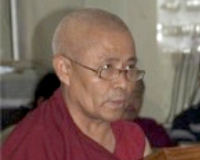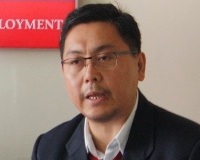Hong Kong revolt fans Tibet's 'burning desire for freedom'
by - 31st October 2014
 THE ON-GOING democratic protests in Hong Kong give China an opportunity to fulfill its promises to ethnic minorities and semi-autonomous regions, and improve its international image, leaders of the Tibetan community say.
THE ON-GOING democratic protests in Hong Kong give China an opportunity to fulfill its promises to ethnic minorities and semi-autonomous regions, and improve its international image, leaders of the Tibetan community say.
Speaking to Lapido Media, Acharya Yeshi Puntsok, Member of Tibetan Parliament in Exile said the protests were the ‘most important since Tiananmen Square’.
‘Protesters have been inspired by the struggle for democracy in 1989, and also the protests of the Tibetan community in 2008. These students and teenagers have done a great job to express the indomitable desire for full democracy in China.’
Protesters in Hong Kong began a civil disobedience campaign after the government announced electoral reforms allowing residents to vote only for those candidates handpicked by a 1200-member committee. There are fears that the committee will nominate only pro-Beijing candidates for the 2017 elections.
The Hong Kong Federation of Students and the student pressure group Scholarism announced protests on 22 September, which quickly evolved into the massive ongoing occupy movement in China’s financial capital.
Democracy
When the protests first gripped Hong Kong at the beginning of October, the Tibetan community in India and around the world enthusiastically expressed their support for the protesters.
At a solidarity rally on 1 October in Dharamsala, the seat of Central Tibetan Administration, President of the Tibetan Youth Congress, Tenzing Jigme said: ‘We support the people of Hong Kong in their quest for democracy, and demand justice and freedom for all those suffering under the brutal policies of the Chinese Communist government.’
 In an interview with Lapido Media, Jigmey Tsultrium, from the India Tibet Coordination Office, said the Chinese government had been ‘short-sighted’ in its response to demands for freedom, and had instead come up with ‘baseless accusations’ that pro-democracy protests were being sponsored by the West.
In an interview with Lapido Media, Jigmey Tsultrium, from the India Tibet Coordination Office, said the Chinese government had been ‘short-sighted’ in its response to demands for freedom, and had instead come up with ‘baseless accusations’ that pro-democracy protests were being sponsored by the West.
‘There is a burning struggle for democracy within China, if the Chinese government does not address these demands in a credible manner and does not do so soon, the flame will be huge.’
Conspiracy
On 12 October, the Chinese authorities responded to Hong Kong protests by accusing the West of conspiring with the pro-democracy protesters to destabilise China.
‘It is important that China’s government blames the West for these protests [or] else it undermines its claims of peace, prosperity and stability in the state,’ says Shishir Ghimire, researcher at the Institute of Chinese Studies in New Delhi.
China’s concerns over territorial integrity have been heightened by the recent Scottish referendum, according to news sources, and state-owned media have repeatedly stressed that a possible future referendum would adversely affect the country’s social and political stability.
Yet, ethnic minorities in regions like Tibet and Xingjian cite Beijing’s unfulfilled promises of autonomy and freedom as prime reasons for pushing these communities towards conflict. The state policy of strong-arming these groups towards assimilation has deepened suspicions between the state and ethnic minorities.
In 2009, following Taiwan’s Ministry of Foreign Affairs' initial decision to refuse a visa to the Dalai Lama, the country’s Internal Administration Committee passed a resolution to invite the Tibetan spiritual leader to visit them. The Dalai Lama has since visited Taiwan a number of times and enjoys wide-ranging support.
However, the nature of this support is unofficial, says Jigmey Tsultrium. ‘There is no official policy to work with each other.’
Values
Puntsok agrees: ‘They know our reality and we know their reality. We support them not because of some selfish interest but because we support the values of freedom, democracy and human rights.’
He adds that unlike the Tiananmen Square protests in 1989, this time people are better acquainted with the urgency of democracy and freedom. China too has shown signs of understanding that it cannot forever suppress its population.
Puntsok places his hopes on continued external pressure and domestic stirrings to force China into becoming a more open and free society.
‘The globe is interdependent,' he said. 'China seeks to be a member of all important international organisations, but if they really want to be a respectable global partner they have to learn to respect international solidarity to global values and norms.
'When it comes to China’s economy, they welcome international support, but when it comes to democracy they criticise international intervention. They need to solve the problem, not pass the blame.’
